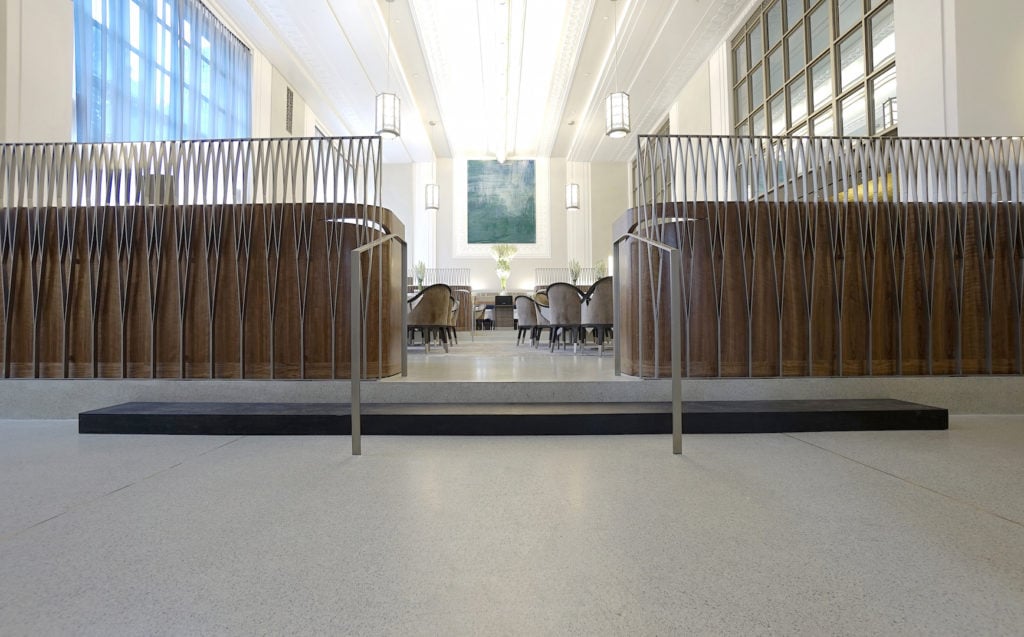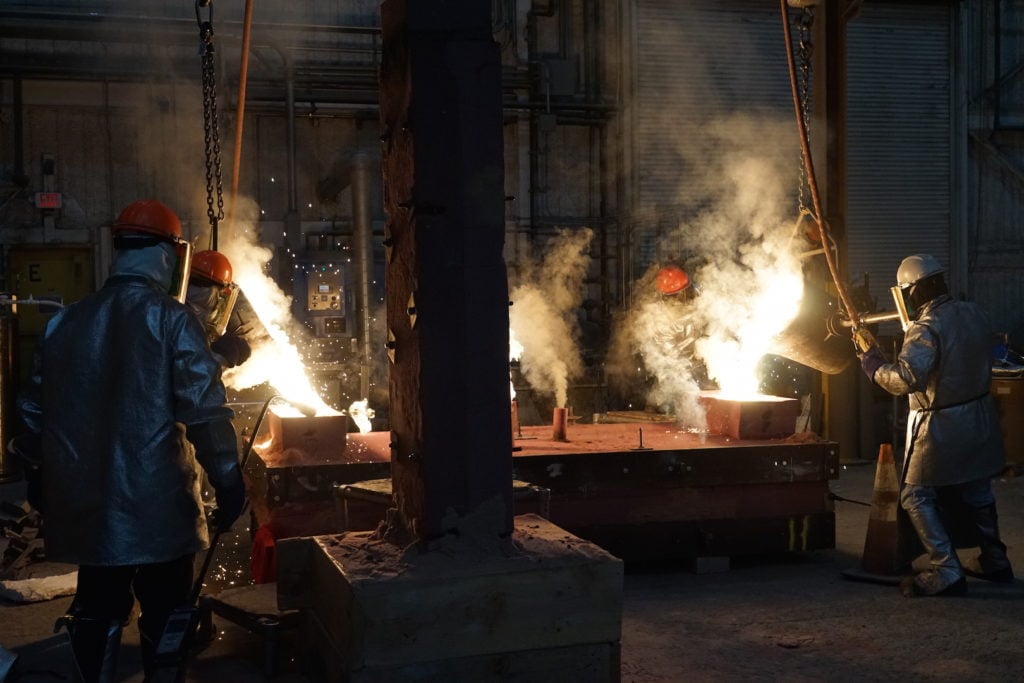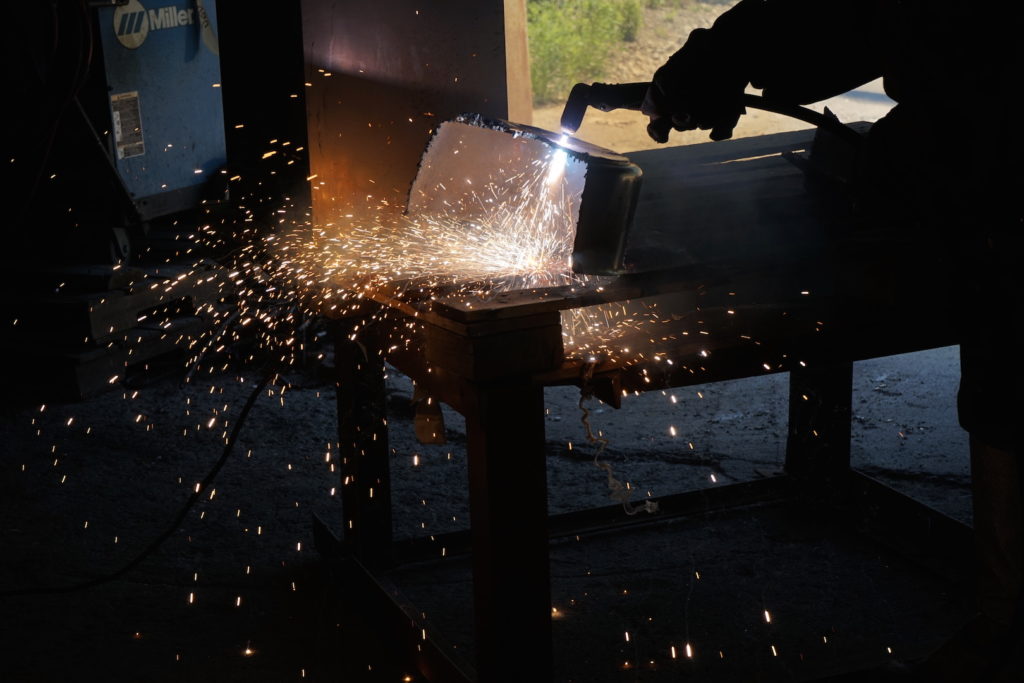On View
The World’s Best Chef Let an Artist Melt Down His Kitchen and Make an Artwork Out of It
The restaurant also unveiled works by Rita Ackermann and Olympia Scarry at its reopening this week.

The restaurant also unveiled works by Rita Ackermann and Olympia Scarry at its reopening this week.

Sarah Cascone

The best restaurant on the planet—at least according to the Restaurant magazine list “World’s 50 Best Restaurants“—is New York’s Eleven Madison Park, which reopened on Sunday to debut a $2 million gut renovation of its 20-year-old kitchen. It turned out, however, that many of its old fixtures were still present, just now in the form of a monolithic sculpture cast by artist Daniel Turner.
To create the site-specific installation, which greets diners at the entrance of the new dining room, Turner systematically broke down the existing kitchen. “The kitchen equipment was excavated from the kitchen, archived at my studio, cut up at the foundry, melted down, and poured into the final form that you will see at the restaurant,” he told artnet News.

Daniel Turner creating his monolithic sculpture salvaged from the old kitchen fixtures of Eleven Madison Park. Courtesy of Daniel Turner.
When Eleven Madison Park’s owners, chef Daniel Humm and general manager Will Guidara, who bought the restaurant from Danny Meyer in 2011, secured a 20-year lease renewal, they decided it was time for an overhaul of the space.
Humm had seen Turner’s Particle Processed Cafeteria at König Galerie in Berlin last year—a work made from the chairs, tables, and other components of a cafeteria, which the artist ground down, dissolved into liquid, and sprayed onto the gallery floor—and “was very moved by that sculpture,” Turner said.
“Daniel pushed the boundaries of sculpture,” Humm said. “It’s only this beautiful kind of stain that’s on the floor, but it tells such a rich story.”
When Humm told Turner about the restaurant’s upcoming renovation, which involved completely replacing the kitchen, “I thought it was a great opportunity to work with a similar thought process,” Turner says, and to “re-contextualize the kitchen equipment.”
For Humm, the project is personal. “Art has inspired my food, and art is such a big part of my life,” he said. “My creations of the last 12 years have happened there.” As a result, the renovations have been “kind of emotional,” he said. “The idea of ripping out that kitchen was really hard for me.”
In the end, Turner transformed the kitchen into a long, low-lying sculpture, a 16-foot-long steel monolith that functions as the step down into the dining room. “You’re going to step on it and over it as you enter and exit the restaurant,” Turner said. “It’s truly a touchstone.”
It’s also a fitting tribute to the restaurant’s storied history. “You have to step over the past to be in the present,” Humm said. “This is not just melted steel. There’s such a deep history to it.”
Though the owners gave Turner total creative freedom for the commission, he found it to be a uniquely challenging project. “A restaurant is not an ideal place for sculpture,” Turner said. “I spent some time watching how people interact with the space, and there’s almost a pause as they enter the dining room. I wanted to elaborate on that moment.”
To create the final sculpture, Turner enlisted Polich Tallix, a fine art foundry in upstate New York. They began with sand casting, first making a wooden form and then pressing it into a container full of sand to create a mold in which to pour the molten metal.
After several months, the finished piece fit perfectly in the renovated restaurant. Designed by Brad Cloepfil of the firm Allied Works, the revamped restaurant features an expanded bar and lounge area, while other works of art will appear in the dining room.

Daniel Turner’s sculpture in process at Eleven Madison Park. Courtesy of Daniel Turner.
There’s a Rita Ackermann painting, which is one of her largest-ever canvas works and was inspired by the specially commissioned black-and-white oil paintings by Stephen Hannock that graced the original dining room. “She erased it and made it like an abstract work,” said Humm of Ackermman’s take on the original series, which was inspired by vintage photographs of Madison Square Park.
Above the restaurant entrance is another work, Olympia Scarry’s painted beige glass panels, titled 11/11 Windows. “It plays with the light and it reflects it,” said Humm. “The idea is of changing direction, like the restaurant does.”
Just outside, in the park, is the Sol LeWitt lawn, named for the late artist who made Madison Square Art’s earliest public artworks in 2005. At the suggestion of his daughter, Sofia LeWitt, the restaurant now features a colorful wall drawing installed by his foundation.
Also new is nearly the entire menu. The restaurant earned its accolades—four stars from the New York Times both in 2009 and 2015—for Humm’s a tasting menu, which featured more than a dozen courses.
“We’re digging into the history of New York more,” Humm said of the new dishes, which include a smoked sturgeon cheesecake and a roasted kabocha squash, all done in the chef’s increasingly minimal style. “It’s a beautiful moment for me as a chef, because after 25 years of cooking, I feel like only in the last few years I’ve found myself fully.”